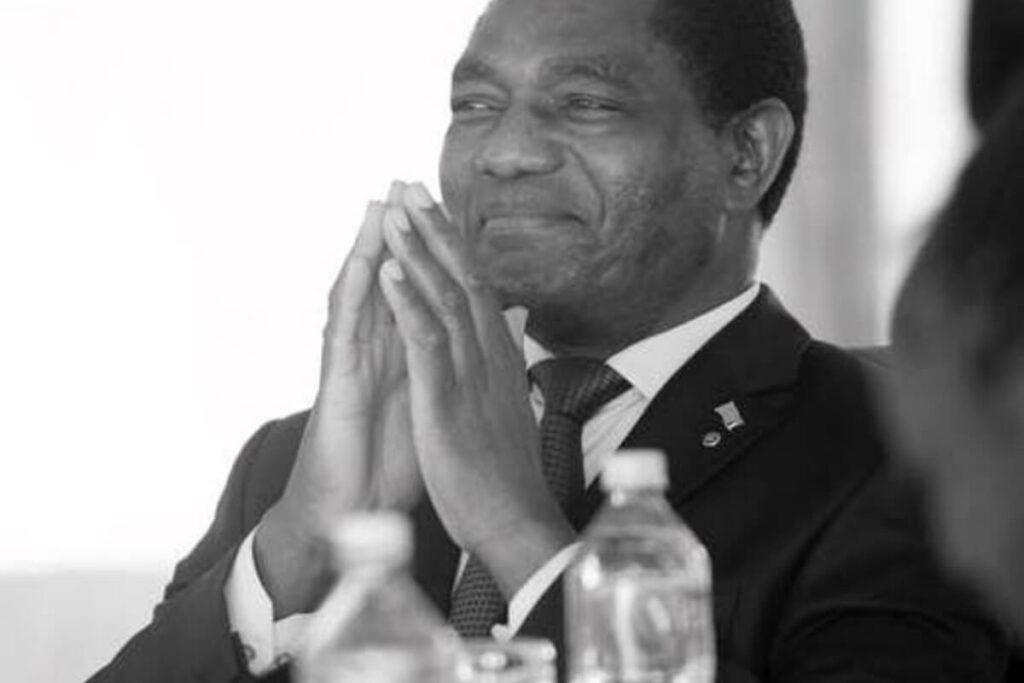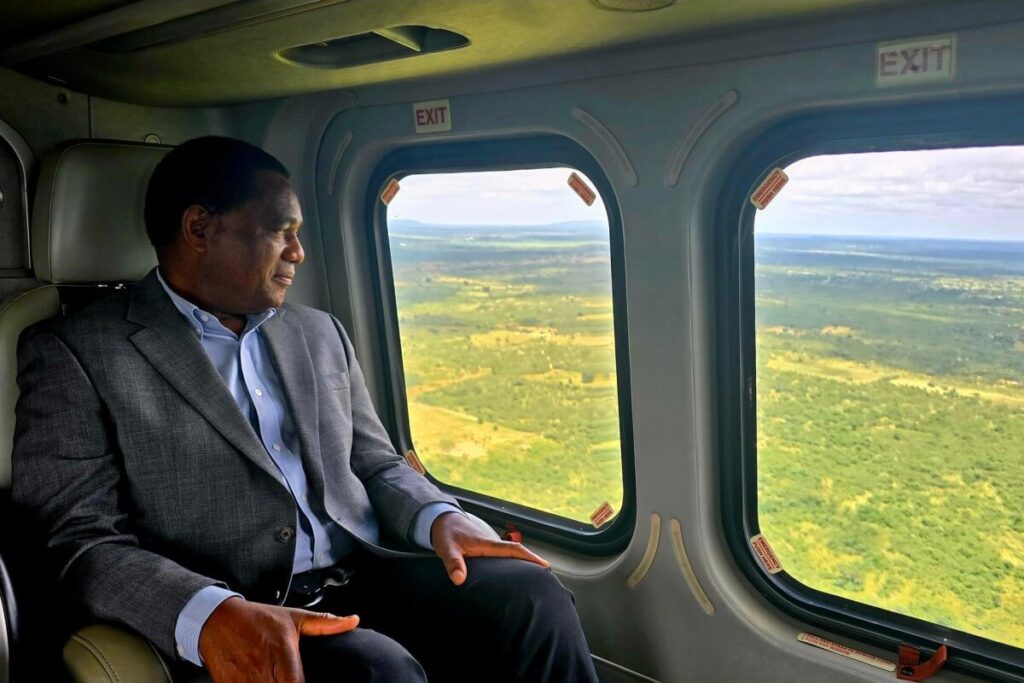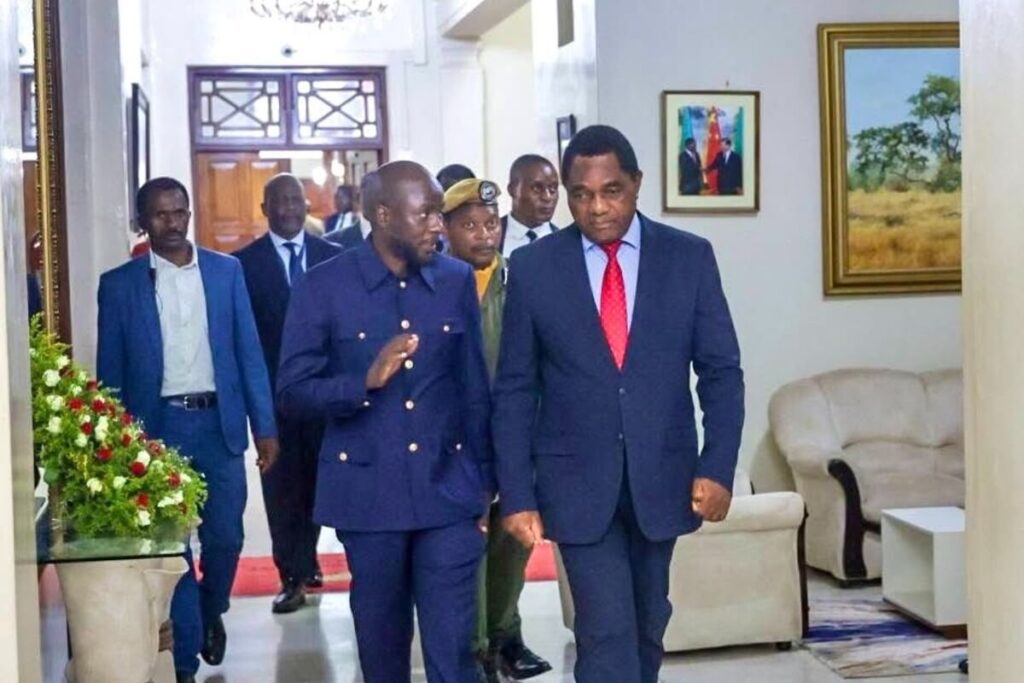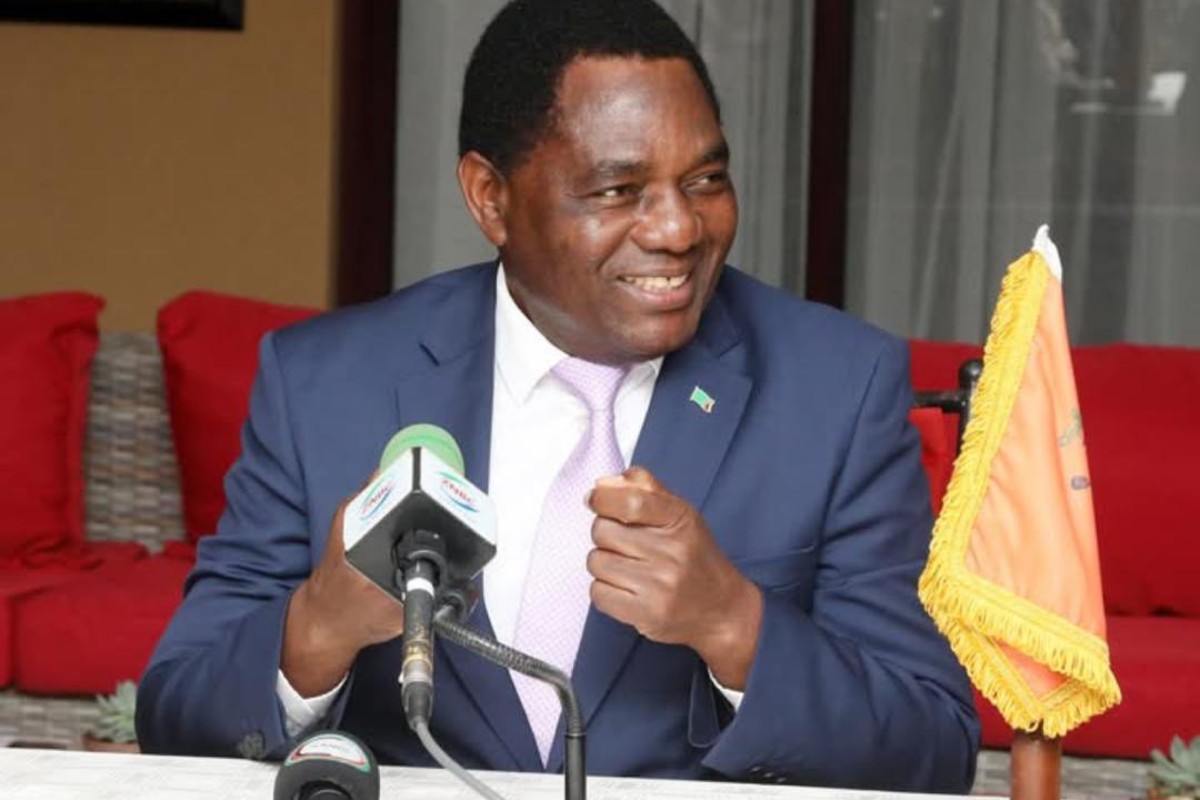Hakainde Hichilema, often called “HH” by supporters and the public, is the seventh President of the Republic of Zambia. His rise to power is not just a political story, but a personal journey of perseverance, ambition, and unwavering belief in democratic principles.
Early Life and Education of Hakainde Hichilema
Hakainde Hichilema was born on June 4, 1962, in a remote village called Bweengwa, located in Monze District in Zambia’s Southern Province. He grew up in a poor household, raised by peasant farmers who relied on subsistence agriculture. From a young age, Hichilema understood the value of hard work, often helping with cattle herding and farming chores after school.
Despite limited resources, his academic potential was evident early on. He excelled in school and earned a government scholarship to attend the University of Zambia (UNZA), one of the country’s most prestigious institutions. There, he studied Economics and Business Administration, graduating with a Bachelor’s degree. Driven to go further, Hichilema later pursued an MBA in Finance and Business Strategy from the University of Birmingham in the United Kingdom.
Business Career
Before entering politics, Hichilema built a successful and respected career in Zambia’s private sector. He worked as an economist and corporate executive, rising through the ranks to become the CEO of Coopers & Lybrand Zambia, which later became Grant Thornton Zambia, one of the country’s leading financial advisory firms.
Through the years, he served on the boards of various companies and was involved in agriculture, ranching, and property development. His financial success made him one of Zambia’s wealthiest individuals, but also a target of criticism from political rivals, who tried to portray him as disconnected from ordinary citizens. Hichilema, however, has always maintained that his wealth was earned through discipline, integrity, and hard work.
Entry into Politics
Hichilema’s political journey began in 2006 following the death of Anderson Mazoka, the founding leader of the United Party for National Development (UPND). Hichilema was chosen to take over the party’s leadership, a decision that sparked both hope and controversy. Many questioned whether a businessman with no political experience could lead a major opposition party, let alone challenge the ruling government.
Over the next 15 years, Hichilema became the face of Zambia’s democratic opposition. He ran for president five times—in 2006, 2008, 2011, 2015, and 2016—losing each time but gaining ground with every election. His campaigns were often marked by harassment, arrests, and political violence. In 2017, he was arrested and charged with treason, an act widely seen as politically motivated. He spent over 100 days in prison, during which time he became a symbol of resistance to authoritarianism. His release only strengthened his resolve.
2021 Presidential Victory
Hakainde Hichilema’s persistence finally paid off in August 2021, when he defeated incumbent President Edgar Lungu in a landslide victory. Hichilema’s win was historic—not only because of the margin, but because of the peaceful transfer of power in a region where such transitions are often contested.
Millions of Zambians, especially young voters, supported him in the hope of economic revival, job creation, and an end to corruption. The election was widely praised by international observers and civil society groups for its transparency and fairness.
Presidency and Leadership Focus
Since taking office, President Hichilema has prioritized economic recovery, debt restructuring, anti-corruption reforms, and strengthening democratic institutions. One of his first major tasks was to deal with Zambia’s mounting debt crisis—Zambia had become the first African country to default on its debt during the COVID-19 pandemic.
His government has worked closely with the International Monetary Fund (IMF) and other financial institutions to stabilize the economy. He has also emphasized education, healthcare, and investment in agriculture, recognizing these as critical areas for long-term growth.
On the international stage, Hichilema has worked to rebuild Zambia’s global image, fostering stronger ties with neighboring countries and global partners. He’s been outspoken about the importance of democratic governance and respect for human rights, not only in Zambia but across Africa.

Personal Life of Hakainde Hichilema
Away from politics, Hakainde Hichilema is a family man. He is married to Mutinta Hichilema, and together they have three children. He is known to be a devoted Christian, and often speaks about how his faith has guided him through difficult times.
He still maintains his love for farming and cattle ranching. In fact, he has often said that he feels most at peace when he visits his rural home and tends to his animals.
Legacy and Public Perception
To many Zambians, Hichilema represents hope, change, and the power of perseverance. His life story—from a barefoot village boy to the presidency—is an inspiration, especially for Zambia’s youth. While challenges remain, including unemployment and inflation, there’s a widespread sense that Zambia is on a more stable and transparent path under his leadership.
He is not without critics—some argue that expectations are high and that progress has been slower than anticipated. But even his opponents acknowledge that his commitment to democracy, fiscal responsibility, and rule of law marks a departure from previous administrations.
Challenges in Office
Since assuming the presidency, Hakainde Hichilema has faced both optimism and immense pressure. Zambians voted for change with high expectations, hoping for quick fixes to deep-rooted problems like unemployment, poverty, rising prices, and poor infrastructure. However, governing has proven more complex than campaigning.
One of the major challenges his administration has faced is managing Zambia’s external debt, which was estimated to be over $17 billion when he took office. The debt crisis limited the government’s ability to invest in public services and infrastructure. In response, Hichilema’s government secured a bailout package from the International Monetary Fund (IMF) and began negotiating with creditors, including China and other bilateral partners, to restructure debt under more favorable terms.
This process has been slow and often unpopular, especially among citizens who feel the economic relief hasn’t come fast enough. The government has had to walk a fine line between restoring fiscal discipline and ensuring that austerity measures don’t worsen living conditions.
Anti-Corruption Drive
One of President Hichilema’s key promises during the campaign was to fight corruption. Under his leadership, several former government officials have been investigated and, in some cases, arrested on charges of corruption and abuse of office.
While many citizens welcomed these moves, others raised concerns about the fairness of the process and whether it was being used to settle political scores. Hichilema has consistently stated that the fight against corruption is not about revenge but about restoring integrity in public service.
His government has also committed to strengthening institutions such as the Anti-Corruption Commission (ACC) and the Financial Intelligence Centre, giving them more independence and resources to operate effectively.
Focus on Youth and Jobs
With more than 60% of Zambia’s population under the age of 25, youth unemployment remains one of the most pressing issues. Hichilema has acknowledged this openly and introduced programs aimed at job creation, entrepreneurship, and skills training.
In the education sector, his government reintroduced free education for primary and secondary schools, a policy that was widely praised. Enrolment numbers surged, though the system now faces pressure to handle the increased demand with limited resources.
Efforts have also been made to promote investment in digital innovation, agriculture, and tourism as key areas for economic diversification beyond copper mining.
Restoring Zambia’s Image Abroad
Under Hichilema’s leadership, Zambia has sought to re-engage the international community. He has traveled extensively since taking office, meeting with global leaders, investors, and financial institutions. His administration has emphasized transparency, rule of law, and investor confidence, trying to portray Zambia as a stable and reliable partner.
In regional politics, he has played a more visible role, particularly in SADC (Southern African Development Community) affairs, advocating for peace, democracy, and economic cooperation. His calm and diplomatic style has earned him respect among African leaders, especially in contrast to more combative political figures in the region.

Leadership Style
President Hichilema is known for his measured, calm, and professional demeanor. He rarely raises his voice in public and prefers to speak with facts and data. He often uses terms like “fiscal discipline,” “economic transformation,” and “servant leadership” to describe his governance approach.
Critics sometimes label him as overly cautious or too business-minded, while supporters argue that his steady hand is exactly what Zambia needs after years of instability and mismanagement.
His leadership style reflects his corporate background—focused on results, systems, and accountability. He has emphasized decentralization, pushing decision-making power closer to local communities, and promoting civil service reform to reduce inefficiency and political interference.
Might you have missed: The Witchcraft Act and President Hichilema
Personal Values and Beliefs
At the core of Hichilema’s public image is a man who has never forgotten his roots. He often speaks of his childhood in rural Zambia, recalling how he walked long distances to attend school and how his parents instilled in him a strong sense of discipline and humility.
He is a devout Christian and frequently quotes scripture in his speeches. He avoids flashy displays of wealth and maintains a relatively modest public profile, considering his background in business.
He has also remained a strong supporter of freedom of speech and independent media, which had come under pressure in previous administrations. Under his leadership, there has been a notable improvement in press freedom and the ability of civil society to operate without intimidation.
Hakainde Hichilema’s presidency is still in its early years, but it has already left a significant mark on Zambia’s political and economic landscape. He inherited a nation burdened with debt, shaken by years of corruption, and hungry for change. His task is not easy, and his success will depend on how effectively he delivers results while keeping public trust.
Many Zambians are watching closely—some with hope, others with skepticism—but few doubt the significance of what his rise represents: that in a democracy, even a man from a rural village, with no political dynasty or military power behind him, can become president through sheer determination and the will of the people.
The United Party for National Development (UPND)
The United Party for National Development (UPND) is one of Zambia’s leading political parties and the current ruling party under the leadership of President Hakainde Hichilema. Known for its strong advocacy of democracy, economic reform, and social justice, the UPND has become a central force in Zambian politics, especially in the past two decades.

Formation and Early Years
The UPND was founded in 1998 by the late Anderson Mazoka, a respected businessman and former Managing Director at Anglo American Corporation. Mazoka’s vision for the party was rooted in economic empowerment, national unity, and the need for a credible opposition to the then-dominant Movement for Multi-Party Democracy (MMD).
In the 2001 general election, the UPND, under Mazoka’s leadership, performed strongly and came in second place, establishing itself as a serious contender on the national stage. Tragically, Mazoka passed away in 2006, leaving a leadership vacuum in the party.
Hakainde Hichilema Takes Over
Following Mazoka’s death, the UPND elected Hakainde Hichilema (HH) as its new party president in 2006. At the time, Hichilema was a successful businessman with no political background, and his appointment was met with mixed reactions. However, he brought new energy and a long-term vision to the party.
Under Hichilema’s leadership, the UPND positioned itself as a reform-oriented, people-driven party that emphasized economic growth, job creation, good governance, and anti-corruption.
Years in Opposition
From 2006 to 2021, the UPND operated as the main opposition party in Zambia. During this time, it participated in multiple presidential and general elections, with Hichilema running as its presidential candidate in 2006, 2008, 2011, 2015, and 2016. Though the party lost all these elections, its support base continued to grow steadily, especially among youth, urban voters, and the educated middle class.
During these years, the UPND often raised concerns about electoral irregularities, media censorship, and political intimidation, particularly under the rule of the Patriotic Front (PF) government. Hichilema himself was arrested several times, most notably in 2017 when he was charged with treason—a move that drew international condemnation.
Despite the setbacks, the UPND maintained a strong organizational structure, with active grassroots mobilization across the country. The party’s ability to survive and grow in difficult political conditions became one of its defining characteristics.
2021 Electoral Victory
After more than 15 years in opposition, the UPND achieved a historic victory in the August 2021 general election. Hichilema won the presidency with over 59% of the vote, defeating the incumbent Edgar Lungu of the Patriotic Front in a landslide.
The party also secured a majority in the National Assembly, allowing it to implement key policy initiatives without significant obstruction. The UPND’s victory was seen as a major moment for democracy in Africa, showcasing the power of peaceful political change through the ballot box.
Ideology and Core Values
The UPND identifies itself as a liberal-democratic party. Its core values include:
-
Economic Development: Promoting private sector growth, foreign investment, and entrepreneurship.
-
Education and Health: Expanding access to quality education and healthcare for all Zambians.
-
Good Governance: Strengthening institutions, rule of law, and fighting corruption.
-
Human Rights: Protecting civil liberties, freedom of the press, and political freedoms.
-
National Unity: Bridging ethnic and regional divides, and promoting inclusive leadership.
-
Youth and Women Empowerment: Creating opportunities for marginalized groups in politics and the economy.
Party Structure
The UPND has a well-organized structure with national, provincial, district, and constituency-level branches. It also has active wings for women, youth, and students, which play a key role in mobilization and outreach.
The National Management Committee (NMC) is the top decision-making body, overseeing strategic planning and policy direction. The party also holds general conferences where members elect leaders and debate party policies.
Current Role and Outlook
As the ruling party, the UPND faces the challenge of delivering on its campaign promises, particularly in the areas of economic recovery, job creation, healthcare reform, and education. While many Zambians remain hopeful, others are watching closely to see how the party manages expectations in a difficult global and domestic economic environment.
The UPND continues to promote itself as a government of the people, emphasizing accountability, transparency, and service delivery. Hichilema has called for a shift in political culture—away from patronage and towards professionalism, merit, and ethics in public service.
Legacy and Impact
The UPND’s rise from opposition underdog to ruling party is a remarkable story in Zambian politics. It stands as an example of resilience, strategic growth, and the power of democratic organization. Its legacy will ultimately be shaped by how well it delivers on its promises and whether it can sustain public trust over the long term.
Conclusion
The story of Hakainde Hichilema and the United Party for National Development (UPND) is one of perseverance, vision, and the enduring strength of democratic ideals. From humble beginnings in rural Zambia to the highest office in the land, Hichilema’s journey has inspired millions—proving that leadership grounded in hard work, education, and integrity can bring real change.
His presidency marks a turning point in Zambia’s political landscape. While the road ahead is filled with challenges—ranging from economic recovery to public sector reform—there is a renewed sense of hope and direction in the country. The UPND, once seen as a long-standing opposition force, now carries the responsibility of governance, policy delivery, and maintaining the public trust it fought so long to earn.
Together, Hichilema and the UPND represent more than just a political victory—they represent a promise: that Zambia’s democracy is alive, that peaceful change is possible, and that leadership rooted in service, transparency, and accountability can move a nation forward.
As Zambia continues to face the complexities of modern governance, global economic pressures, and social transformation, the ultimate test for Hichilema and his party will be their ability to translate vision into tangible outcomes. If they succeed, their legacy could reshape not only Zambia’s future but also serve as a model for democratic leadership across the African continent.

